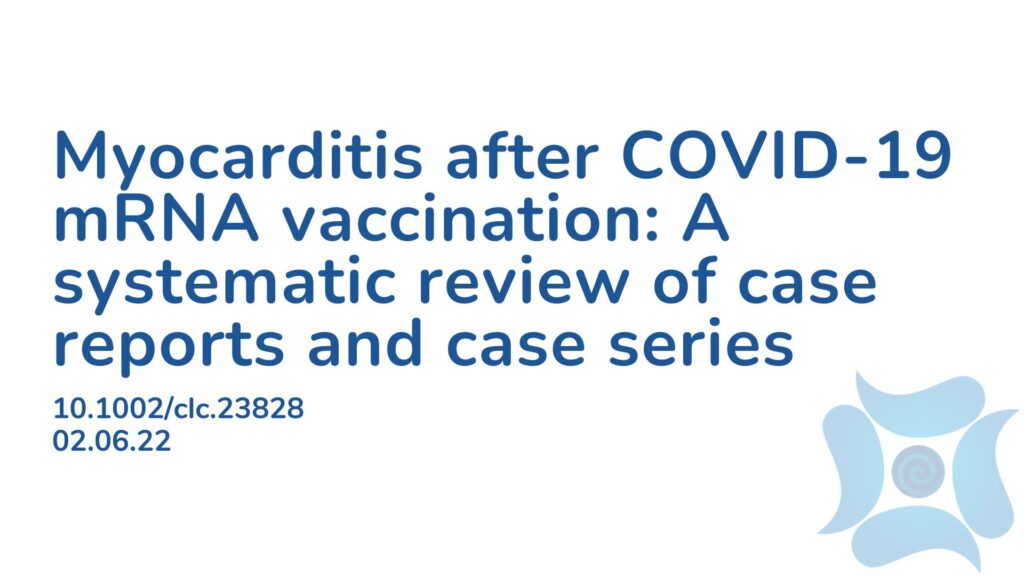Summary: Some studies have reported adverse reactions to the currently available COVID-19 vaccinations, such as fever, fatigue, headaches, anaphylaxis, thrombosis, Guillain–Barre syndrome and myocarditis. The number of cases of of myocarditis in particular has been addressed by the Centers for Disease Control and Prevention (CDC) as they have reported a total of 1226 cases after a mRNA vaccination. The CDC also noted that the number of myocarditis cases reported after the second dose of the vaccine was significantly higher than expected. With the introduction of COVID-19 vaccination recommendations to children and further booster vaccinations being recommended to adults, the authors of this paper thought it important to perform an updated systematic review of COVID-19 vaccine-associated myocarditis. A total of 57 studies containing 275 cases of COVID-19 vaccine-associated myocarditis patients were included. The results showed that the mean age was 26.7 years and a male to female ratio was 14:1. For over 86% of patients, myocarditis occurred after the second vaccination. The average time to onset of myocarditis and length of hospitalisation were 3.7 and 3.9 days. Despite these results, there are many unanswered questions regarding the mechanism, as the true incidence of myocarditis after a COVID-19 vaccinations remains unclear. There are also no papers to date that elucidate causation, just correlation.
Abstract:
Background: The coronavirus disease of 2019 (COVID-19) is a global pandemic with over 266 million cases and 5 million deaths worldwide. Anti-COVID-19 vaccinations have had exceptional success in subduing the incidence, prevalence, and disease severity of COVID-19, but rare cases of myocarditis have been reported after COVID-19 vaccinations.
Hypothesis: Myocarditis occurring after COVID-19 mRNA vaccinations have distinguishable clinical characteristics. They usually have a favorable prognosis.
Methods: We performed a systematic literature search on PUBMED and MEDLINE database from inception to December 5, 2021. Studies were analyzed based on predetermined eligibility criteria.
Results: A total of 57 studies containing 275 cases of COVID-19 vaccine-associated myocarditis were catalogued. Mean age was 26.7 years and male to female ratio was 14:1. For 86.9% of patients, myocarditis occurred after the second dose. Average time to onset and length of hospitalization were 3.7 and 3.9 days, respectively. Prognosis was largely benign, but there was a 1.1% reported mortality. Chest pain (95.2%), elevation of troponin (100%), and ST elevation on electrocardiography (68.5%) were common. Nonsteroidal anti-inflammatory drugs (81.4%) were the most used medication, followed by colchicine (33.1%).
Conclusions: Patients with COVID-19 vaccine-associated myocarditis are usually younger males presenting with chest pain 3–4 days after receiving their second dose of COVID vaccine. Diagnosis is made by exclusion of all other etiologies. Given significant population benefit from COVID-19 vaccination, physicians should continue to encourage vaccination while remaining vigilant of the very rare occurrence of myocarditis following COVID-19 vaccination
Article Publication Date: 02.06.22
DOI: 10.1002/clc.23828



